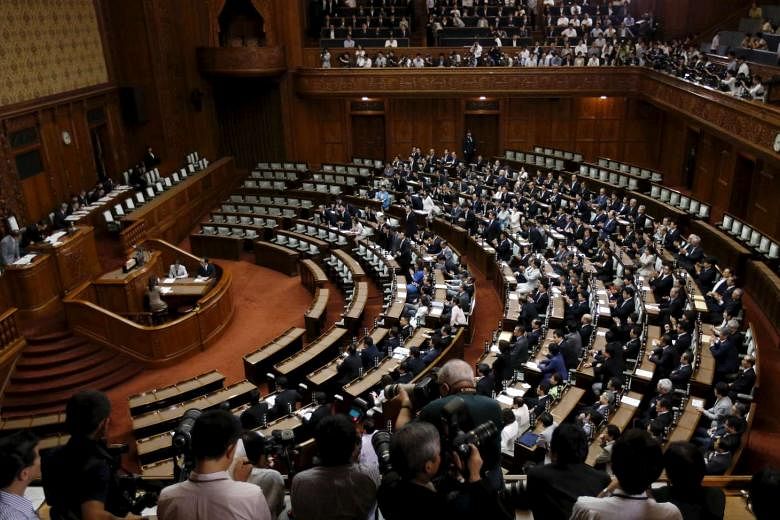Japan's parliament has approved legislation that will expand the role of its highly restricted military, opening up the possibility that it could fight abroad for the first time since World War II.
Prime Minister Shinzo Abe says the shift, the biggest change in Japan's defence policy since the creation of its post-war military in 1954, is vital to meet new challenges such as a rising China. But the legislation has triggered massive protests from ordinary citizens and others who say it violates the pacifist constitution and could ensnare Japan in US-led conflicts .
Here are some key questions and answers about the legislation and its potential impact:
Q: How big is Japan's military and what are the current restrictions on it?
Japan's military - the Self Defence Forces - has 227,000 personnel across its army, navy and air force. That is small compared to China's 2.33 million and 1.43 million in the United States, but more than Britain, Germany and France.
Currently, the Self Defence Forces can only use force for self-defence if the country or they themselves are directly attacked.
The rule is based on the Japanese constitution, drafted by the US after Japan's defeat in the World War II, which bans the "use of force as means of settling international disputes".
Q: How will the new law change this? When will Japan's troops be able to go into battle?
The law allows Japanese troops to defend their American counterparts and also troops of other nations friendly to Japan.
It will take six months to come into effect, but the government still has to seek parliamentary approval before sending troops on any dangerous overseas missions.
The government would also have to prove that, without the mission, Japan and its people would face grave danger.
Q: Why is this so controversial in Japan?
 Protesters reacting after Japan's parliament approve the security bills at a rally against Japan's Prime Minister Shinzo Abe's security bill and his administration in front of the parliament in Tokyo on Sept 19, 2015. PHOTO: REUTERS
Protesters reacting after Japan's parliament approve the security bills at a rally against Japan's Prime Minister Shinzo Abe's security bill and his administration in front of the parliament in Tokyo on Sept 19, 2015. PHOTO: REUTERS
Bitter memories of the carnage of World War II - including the massive loss of life from two atomic bombs - still shape Japanese society.
Many see the constitution's anti-war clause as a defining aspect of the national character and are proud of their seven decades of pacifism.
Critics, including students, lawyers, academics and young and old alike, have spoken out passionately against the changes.
Q: Opponents say the change will drag Japanese troops into US-led wars in the Middle East. Is that likely?
Abe has repeatedly said Japan will not get involved in messy, long-running armed conflicts. He has also argued the changes would make possible threats, such as North Korea, less likely to attack Japan and help forge even closer ties with the US, which has backed the new laws.
But opponents say the vague wording of the bill could allow for combat missions in the future. They also worry that Japan could now be seen as an enemy by those fighting the US.
Those fears were heightened in September when Japan beefed up security across its embassies worldwide after a threat from the Islamic State in Iraq and Syria (ISIS), eight months after the militants claimed beheading of two Japanese hostages in Syria.
Q: Are there likely to be any legal challenges to the legislation?
Yes, both to its content and the way the government has pushed it through parliament.
Opponents, including dozens of respected legal scholars, say the legislation violates Japan's constitution, which would require a public referendum to change.
Abe's government has so far avoided putting it to a public vote - which he would likely lose - by reinterpreting the meaning of "self defence" to include defending allies and friends.
Opponents of the legislation have said they would challenge it in the legal system, a slow-moving process that could take years to get a final ruling.
The legislation could also be overturned if the supreme court rules the changes as unconstitutional.
Q: What do other countries say?
China said the move was "unprecedented". "We solemnly urge Japan to learn the lessons of history ... uphold the path of peaceful development and act cautiously in the areas of the military and security, and do more to help push regional peace and stability rather than the opposite," its Foreign Ministry said.
South Korea urged Japan to maintain the spirit of the pacifist constitution and contribute to regional peace and stability when deciding on and implementing its security and defence policy.
SOURCES: AGENCE FRANCE-PRESSE, REUTERS

